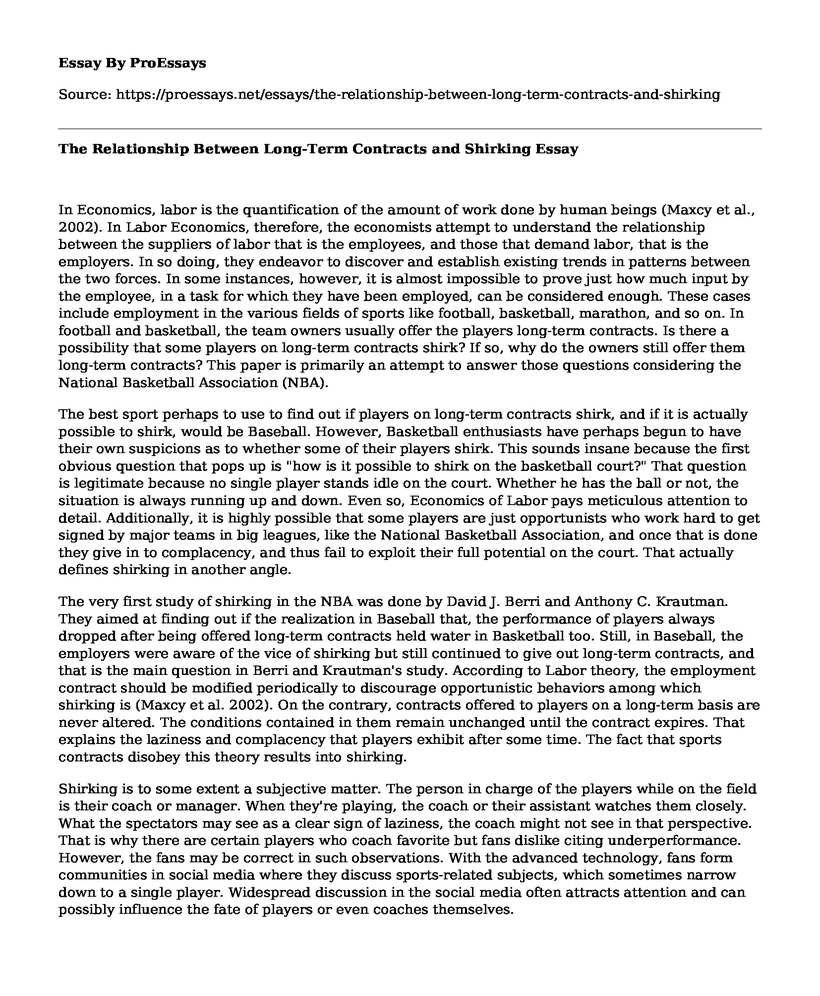In Economics, labor is the quantification of the amount of work done by human beings (Maxcy et al., 2002). In Labor Economics, therefore, the economists attempt to understand the relationship between the suppliers of labor that is the employees, and those that demand labor, that is the employers. In so doing, they endeavor to discover and establish existing trends in patterns between the two forces. In some instances, however, it is almost impossible to prove just how much input by the employee, in a task for which they have been employed, can be considered enough. These cases include employment in the various fields of sports like football, basketball, marathon, and so on. In football and basketball, the team owners usually offer the players long-term contracts. Is there a possibility that some players on long-term contracts shirk? If so, why do the owners still offer them long-term contracts? This paper is primarily an attempt to answer those questions considering the National Basketball Association (NBA).
The best sport perhaps to use to find out if players on long-term contracts shirk, and if it is actually possible to shirk, would be Baseball. However, Basketball enthusiasts have perhaps begun to have their own suspicions as to whether some of their players shirk. This sounds insane because the first obvious question that pops up is "how is it possible to shirk on the basketball court?" That question is legitimate because no single player stands idle on the court. Whether he has the ball or not, the situation is always running up and down. Even so, Economics of Labor pays meticulous attention to detail. Additionally, it is highly possible that some players are just opportunists who work hard to get signed by major teams in big leagues, like the National Basketball Association, and once that is done they give in to complacency, and thus fail to exploit their full potential on the court. That actually defines shirking in another angle.
The very first study of shirking in the NBA was done by David J. Berri and Anthony C. Krautman. They aimed at finding out if the realization in Baseball that, the performance of players always dropped after being offered long-term contracts held water in Basketball too. Still, in Baseball, the employers were aware of the vice of shirking but still continued to give out long-term contracts, and that is the main question in Berri and Krautman's study. According to Labor theory, the employment contract should be modified periodically to discourage opportunistic behaviors among which shirking is (Maxcy et al. 2002). On the contrary, contracts offered to players on a long-term basis are never altered. The conditions contained in them remain unchanged until the contract expires. That explains the laziness and complacency that players exhibit after some time. The fact that sports contracts disobey this theory results into shirking.
Shirking is to some extent a subjective matter. The person in charge of the players while on the field is their coach or manager. When they're playing, the coach or their assistant watches them closely. What the spectators may see as a clear sign of laziness, the coach might not see in that perspective. That is why there are certain players who coach favorite but fans dislike citing underperformance. However, the fans may be correct in such observations. With the advanced technology, fans form communities in social media where they discuss sports-related subjects, which sometimes narrow down to a single player. Widespread discussion in the social media often attracts attention and can possibly influence the fate of players or even coaches themselves.
Owners of clubs are embracing the art of attending the matches of their teams. In the stadia, there are always spots that are reserved for the owners or their representatives. Exposed to such triple public scrutiny by coaches/managers, owners, and fans, players would not want to compromise themselves. Considering the difficulty in measuring a player's actual input to rate it as poor or below average, teams are slowly changing the bases of awarding long-term contracts. Some teams are now offering long-term contracts to only players who show exemplary performance over a long period of time. They are using that criterion to eliminate the costs of shirking.
Job security is not the only reason why players shirk. Players in the NBA do not play in isolation. They play with colleagues, team members. A player's productivity depends on the team chemistry. The proverb "iron sharpens iron" also applies to sports. Individual team member's output can be highly boosted by the momentum of the entire team. If a very productive player is hired by a team of slightly less active players, the newcomer's game is highly likely to "slacken off." The whole match is quite a demand and supply affair. Each player has a hidden demand for morale and that affects their output (supply) to the team and other players. The economics of trust also plays a center role especially in the relations between the players and the coach.
References
Maxcy, J., Fort, R. and Krautman, A. (2002). The Effectiveness of Incentive Mechanisms in Major League Baseball, Journal of Sports Economics, 3(3), 246-55.
Cite this page
The Relationship Between Long-Term Contracts and Shirking. (2022, Apr 04). Retrieved from https://proessays.net/essays/the-relationship-between-long-term-contracts-and-shirking
If you are the original author of this essay and no longer wish to have it published on the ProEssays website, please click below to request its removal:
- Course Work on Management: Leadership Effectiveness
- Organizational Culture Paper Example
- Essay Example on Criminal Justice, Intercultural Prejudice, and Employment Opportunities
- Decision Making Systems: How Technology Enhances Benefits - Essay Sample
- Job Search for Expansion of Holiday Villas Hotels in Spain - Essay Sample
- Leaders Need to Articulate a Vision: 3 Reasons Why - Essay Sample
- Computers and Globalization - Report Example







